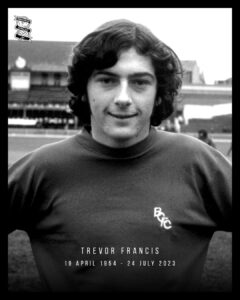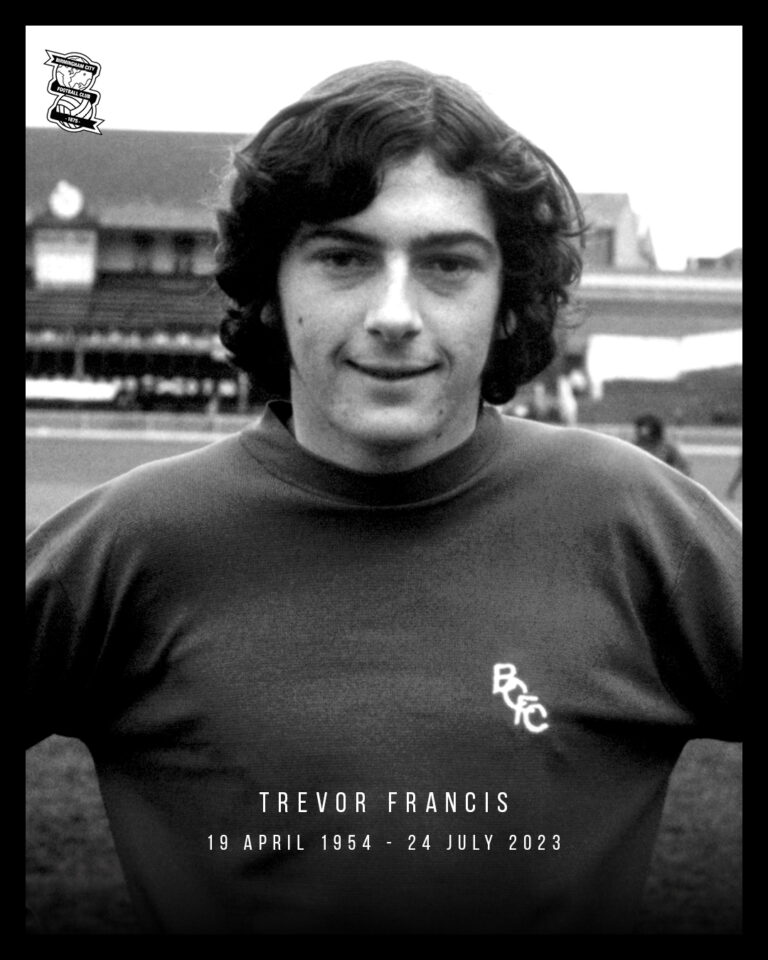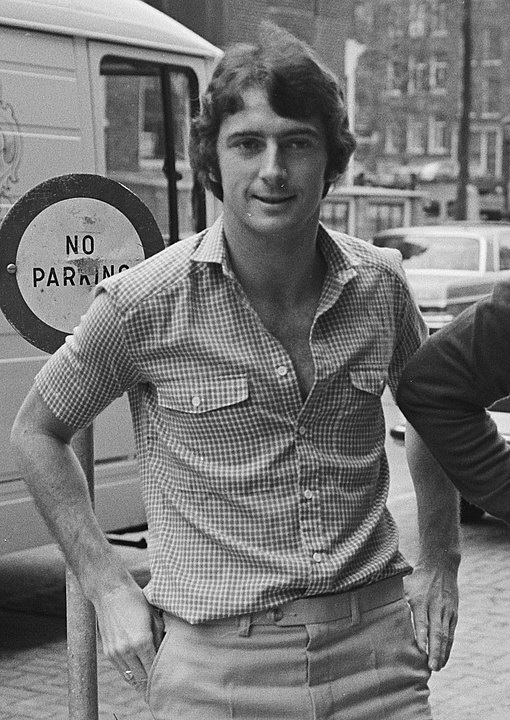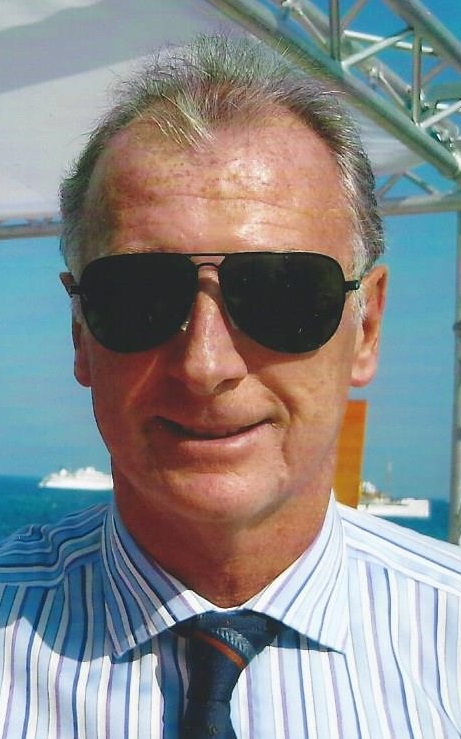
There is only one team in Birmingham worth supporting with true passion, and Birmingham City is it. I have been supporting them since 1979, when Jim Smith was the manager. I was 13 at the time. He is my favourite manager to date. I am a blue nose ’til I die.
You can read lots more about Blues by clicking here.
The 24th of July 2023 was a day of shock and sadness for those associated with Birmingham City Football Club on the news that Trevor Francis had died. Trevor wore the number 8 shirt and was certainly the most well-known player for B.C.F.C., adored by many. You can read my tribute post to him here.
I never got to see him play in person. I was only in my early teens when I started supporting Blues and could only dream of going to St. Andrews, but I saw him on television work his magic on the pitch. He was at the end of his Blues career when I first started following Jim Smith and the Lads. I can’t exactly recall when it was, but it was around the time he was sold to Nottingham Forest as the first million-pound player in British history. I continued to watch him for Forest, cementing my love for them and their manager, Brian Clough. Forest automatically became my second team until Clough retired in 1993.
R.I.P. Trevor.

Contents
About Trevor Francis
Trevor Francis was an English footballer who played as a forward for a number of clubs in England, the United States, Italy, Scotland and Australia. In 1979 he became Britain’s first £1 million player following his transfer from Birmingham City to Nottingham Forest. He scored the winning goal for Forest in the 1979 European Cup final against Malmö. He won the European Cup again with the club the following year. At international level, he played for England 52 times between 1976 and 1986, scoring 12 goals, and played at the 1982 FIFA World Cup.
Between 1988 and 2003, Trevor was a football manager with Queens Park Rangers, Sheffield Wednesday, Birmingham City and Crystal Palace.

Trevor Francis in Amsterdam on the 22nd Of April 1980. He was playing for Nottingham Forest at the time.
Early Life And Education
Trevor John Francis was born on the 19th of April 1954, in Plymouth, Devon, and educated at Plymouth’s Public Secondary School for Boys. He was an agile and skilful forward and joined Birmingham City as a schoolboy.
Club Career
Birmingham City
Trevor quickly rose in status, making his debut for Birmingham City’s first team in 1970, aged just 16. His talent was noted when, before his 17th birthday, he scored four goals in a match against Bolton Wanderers. He ended his first season with 15 goals from just 22 games. Birmingham City manager at the time, Freddie Goodwin, compared Trevor to both Jimmy Greaves and Denis Law.
On the 30th of October 1976, he scored one of Birmingham’s most famous goals, when he turned away from the touchline and cut inside two Queens Park Rangers defenders, constantly being forced backwards before suddenly unleashing a 25-yard (23 meters) shot.
Detroit Express
Trevor negotiated a loan from Birmingham in 1978 to play for the Detroit Express in the North American Soccer League where he scored 22 goals in 19 league matches and was named to the N.A.S.L. first XI alongside Franz Beckenbauer and Giorgio Chinaglia before returning home to the Midlands.
Nottingham Forest
Nottingham Forest, the reigning First Division champions and League Cup holders managed by Brian Clough, put in a bid for Trevor which totalled just over £1 million. No player had ever been sold between English clubs for a seven-figure fee before, and the deal was sealed, with Trevor famously being introduced to the media by a manager impatient to play squash. Clough was in his red gym kit and carrying a racquet as he addressed the press conference.
While recognised as the first British million-pound player, the actual transfer fee for the player was £1,150,000, including a 15% commission to the Football League. Clough wrote in his autobiography that the fee was £999,999, as he wanted to ensure the million-pound milestone did not go to the player’s head, although Trevor says that was a tongue-in-cheek remark by Clough.
Nottingham Forest retained the League Cup shortly afterwards without the cup-tied Francis and made progress in the European Cup to the extent that they reached the semi-finals, although Francis was not eligible to play in the competition until the final. They won their semi-final, and in May 1979 Forest took on Swedish club Malmö in the final in Munich, and a major instalment of the huge investment money was repaid just before half time.
The ball was spread to Forest’s winger John Robertson wide on the left and he took on two defenders at once to reach the byline and curl an awkward, outswinging cross towards the far post. Francis had already begun to sprint into position, but even so, he had to increase his pace in order to reach the cross as it dropped and ended up throwing himself low at the ball. He connected with his head and the ball diverted powerfully into the roof of the net. Forest won the match 1–0 and footage of the goal was used in the opening titles to Match of the Day for some years afterwards. A giant picture of Francis stooping to head the ball remains on display in the main entrance and reception area of Forest’s City Ground stadium.
Even though the season ended there, Francis duly headed back to Detroit for another summer playing in the N.A.S.L., where once again he was named to the first XI alongside Johan Cruyff (Los Angeles Aztecs) and Giorgio Chinaglia (New York Cosmos), despite playing only half the season. In his brief career in America, Francis scored 36 goals in 33 regular season matches and had 18 assists.
At Nottingham Forest Clough frequently played Francis on the right wing, rather than in his preferred position as a central attacker. Francis was in the side which lost the 1980 League Cup Final to Wolverhampton Wanderers but missed the European Cup Final against Hamburg due to an injury to his Achilles tendon. Somehow the success of his Forest career never quite reflected his huge fee. He scored only 14 league goals in the 1979 – 80 season and 6 in the next 18 games that he played for Forest. Although still a regular for England, his Achilles injury prevented him from being in the squad for the 1980 European Championships.
Manchester City
The injury kept Trevor out of the game for over six months. He was sold to Manchester City in September 1981, this time for £1.2 million. The deal caused behind-the-scenes friction at Manchester City. During negotiations, City chairman Peter Swales informed manager John Bond that the club could not afford the transfer fee. Bond then issued an ultimatum, which was if Trevor did not sign, Bond would resign. Francis made a promising start at the club, scoring two goals against Stoke City on his debut, but over the course of the season, he was frequently injured. In total, he scored 12 goals in 26 games and made the England squad for the 1982 World Cup.
Back at his club, financial problems were again an issue. Trevor’s contract gave him a salary of £100,000 plus bonuses, which the club could no longer afford to pay to a player who regularly sustained injuries.
Sampdoria
Later that summer, Trevor was approached by Italian club Sampdoria, who paid Manchester City £700,000 for his services. He helped win the 1984–85 Coppa Italia, in the same team as Scotland midfielder Graeme Souness. It was the first time that Sampdoria had won the competition.
Atalanta
Trevor joined Atalanta in 1986. He played 21 league games and scored once in his only season, but added two goals in nine games in the Coppa Italia. Atalanta lost the final to Napoli. He was the second Englishman at the Bergamo-based club after Gerry Hitchens, and by the time of his death, their only other English-born player was Ademola Lookman.
Rangers
Trevor returned to Britain in September 1987 to join Rangers under Graeme Souness. Numerous English players were brought to the Scottish club by Souness as English clubs had been banned from European competition since the Heysel disaster. Trevor cost just £75,000, signed on a pay-as-you-play basis, and won the 1987 – 88 Scottish League Cup, scoring a penalty in the shoot-out.
Queens Park Rangers
Trevor signed for Queens Park Rangers on a free transfer in March 1988 and helped the team finish fifth in the First Division. He scored 10 goals from 26 appearances in the first half of the 1988 – 89 season and took over as player-manager in December 1988 when Jim Smith moved to Newcastle United, but a knee injury in January 1989 put an end to his playing season. He marked his return to the field in September 1989 with a hat-trick against Aston Villa, but was replaced as manager by Don Howe in November 1989 and his playing contract was paid up a few days later.
During his time at Queens Park Rangers, Trevor completed a brief loan in 1988 with an Australian National Soccer League team, Wollongong City, as part of businessman Harry Michaels’ attempt to market football in Australia. Michaels had previously funded the loans of Alan Brazil and Paul Mariner, whom Francis was to replace, and had discussions with Norman Whiteside, Nigel Clough and Michel Platini about playing for the New South Wales-based team.
Sheffield Wednesday
Trevor left Queens Park Rangers in February 1990 to play for Sheffield Wednesday. Despite gaining a good reputation amongst supporters, he could not help the club avoid relegation to the second tier under manager Ron Atkinson for the 1990 – 91 season. However, that season he helped Wednesday win the League Cup, although he was a non-playing substitute in the final, and also gained promotion back to the top flight.
International Career
Trevor played for England 52 times between 1977 and 1986 and scored 12 goals. In 1977, he was given his first England cap by Don Revie, in a 2 – 0 loss against the Netherlands. After missing out on Euro 1980 due to an Achilles injury, Trevor was named in the England squad for the 1982 World Cup in Spain. In the first round of the tournament, he scored in the group games against Czechoslovakia and Kuwait. England was eliminated after goalless draws against both the host nation and West Germany. In the spring of 1986, he made his 52nd and final appearance for England in a victory over Scotland and was subsequently not selected for the 1986 World Cup in Mexico.
Managerial Career
Sheffield Wednesday
After the departure of Ron Atkinson, Trevor took over as manager of Sheffield Wednesday with popular support from the club and supporters. He guided Wednesday to a third-place finish in 1992. The following year, Wednesday reached the F.A. Cup and League Cup finals, losing both to Arsenal, the former after a replay. In 1994, Francis finally retired as a player, shortly before his 40th birthday. He was dismissed as manager a year later after Wednesday finished 13th in the Premiership.
In February 1992, Trevor brought former French international Eric Cantona back from a poor discipline-enforced hiatus in his career by inviting him for a trial at Sheffield Wednesday. However, as the snowy conditions meant that he could only evaluate Cantona on Astro Turf, Francis requested an extension to the trial to see whether Cantona could play on grass. An outraged Cantona walked out on The Owls and was signed (without a trial) by Leeds United, inspiring first them and then Manchester United to success. In a 2012 interview, Trevor said that he had agreed to take Cantona on as a favour to Trevor’s former agent, Dennis Roach, and Michel Platini, who he knew from his time playing in Italy when they approached him about taking on Cantona, and that it was intended as an opportunity for Cantona to put himself in the shop window. Wednesday had only recently been promoted back to the top flight, with most of the squad still being on Second Division-level wages, and the club could not afford to sign him.
Birmingham City
Trevor was hired as Birmingham City manager in 1996, with the club in the First Division. He guided Birmingham to a 10th and 7th-place finish in his first two seasons, missing out on the playoffs on goal difference in the latter. Finishes of 4th, 4th and 5th in the next three seasons resulted in playoff entry, losing each time.
Trevor led Blues to the 2001 League Cup Final, where they lost on penalties to Liverpool. He was dismissed in October of that year. BBC Sport wrote, “Francis, the player, was legendary. Francis, the manager, is the nearly man.”
Crystal Palace
Trevor was manager of Crystal Palace from November 2001 to April 2003. He was appointed by Crystal Palace chairman, Simon Jordan to replace Steve Bruce who had resigned as Crystal Palace manager with the intention of taking the manager’s role at Birmingham City. Litigation followed with Bruce being placed on gardening leave. Of the appointment, Jordan said, “The last two or three weeks have not been easy. I’m bored of Steve Bruce and Birmingham, and what I’m interested in is Trevor Francis and Crystal Palace.” At the time, Trevor said that he had turned down four jobs before accepting the role at Crystal Palace. Under his managership, Palace defeated a Gerard Houllier managed Liverpool in an F.A. Cup fourth-round replay at Anfield in February 2003 and beat Palace’s main rivals, Brighton & Hove Albion, 5 – 0 in October 2002. However, after the team’s second failure to achieve promotion to the Premier League, Simon Jordan dismissed him, stating, “People know I am very unhappy with the selection of our players under Francis. We have a very strong squad and we should have done a lot better this season – a lot of lessons need to be learned from injury prevention and transfer policy.”
Personal Life
Trevor married Helen in 1974. The couple had two children together. On the 5th of April 2017, it was reported that Helen Francis had died.
On the 13th of April 2012, Trevor was reported to be recovering in hospital from a suspected heart attack.
Trevordied of a heart attack at his home near Marbella, Spain, on July 24th, 2023. He was 69.

Trevor Francis in 2009.
Career And Managerial Statistics
Click here to read about Trevor’s club, international and managerial statistics.
Honours
Player
Birmingham City
Football League Second Division runner-up: 1971 – 72.
Detroit Express
American Conference Central Division: 1978.
Nottingham Forest
European Cup: 1978 – 79 and 1979 – 80.
European Super Cup: 1979.
Football League Cup: runner-up 1979 – 80.
Sampdoria
Coppa Italia: 1984 – 85.
Rangers
Scottish League Cup: 1987 – 88.
Sheffield Wednesday
Football League Cup: 1990 – 91.
Individual
P.F.A. First Division Team of the Year: 1976 – 77, 1977 – 78, and 1981 – 82.
Coppa Italia top scorer: 1984 – 85 (9 goals).
Manager
Sheffield Wednesday
F.A. Cup runner-up: 1992–93.
Football League Cup runner-up: 1992 – 93.
Birmingham City
Football League Cup runner-up: 2000 – 01.
Individual
Premier League Manager of the Month: December 1993.
Read more about Trevor Francis’ Wikipedia page here.
Tribute
Visit my A Tribute To Trevor Francis post here.
Blog Posts
Birmingham City: A Tribute To Trevor Francis.
Birmingham City: Blues History.
Birmingham City: First Team Squad For The 2024/25 Season.
Birmingham City: Fixtures, Results And Goal Scorers For The 2024/25 Season.
Birmingham City: Kits For The 2024/25 Season.
Birmingham City: Our 2023/24 Season In Review.
Birmingham City: Staff For The 2024/25 Season.
Birmingham City: Summer Transfers For The 2024/25 Season.
Notes And Links
The image shown at the top of this page is copyright of Birmingham City F.C.
The image above of Trevor Francis In Amsterdam In 1980 is the copyright of Hans van Dijk via Wikipedia. It comes with a Creative Commons licence (CC0 1.0) and is in the Public Domain.
The image above of Trevor Francis in 2009 is the copyright of Wikipedia user Christophe95. It comes with a Creative Commons licence (CC BY-SA 3.0). You can find more great work from him by clicking here.
The above links in the Before Knighthead section will take you to Wikipedia and its content is subject to change.
Birmingham City F.C. – Official website.
Birmingham City on Facebook – This is their official Facebook page.
Birmingham City on Twitter – This is their official Twitter page.
Birmingham City on YouTube – This is their official YouTube page.
Blues Store Online – Birmingham City’s official club store online.
Wikipedia – Official website. Its purpose is to benefit readers by acting as a widely accessible and free encyclopedia that contains information on all branches of knowledge. Funded and hosted by the Wikimedia Foundation, Wikipedia consists of freely editable content whose articles also provide numerous links to guide readers to related pages with more information.
Birmingham Mail – Official website. The Birmingham Mail is a newspaper based in Birmingham, England but distributed around Birmingham, the Black Country, Solihull and parts of Warwickshire, Worcestershire and Staffordshire.